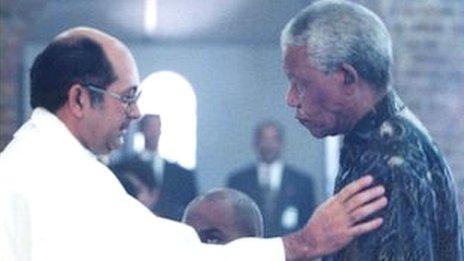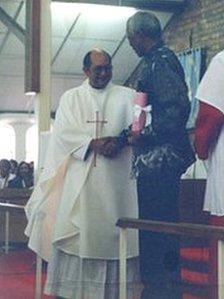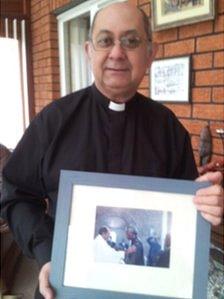Nelson Mandela's death: 'Forgiveness united South Africa'
- Published

Father Robert Dennis said flash photography was banned in his church while Nelson Mandela visited because the president no longer had any tear ducts
A vicar who once gave communion to Nelson Mandela says the former South African president united his country by teaching forgiveness.
The Reverend Robert Dennis was brought up in South Africa during apartheid where racial segregation meant that liberties and freedoms were restricted for non-white people.
Education, medical care and public services were often out of bounds and many black and mixed race youths became either militant or disenfranchised.
But the turning point for the divided country, Fr Dennis believes, came when Mr Mandela was freed from prison in 1990 - after 27 years of being incarcerated for anti-apartheid activities - bringing with him an "aura of peace".
"It was an incredible day, we were ecstatic and were in Cape Town waiting for him," said Fr Dennis, who now lives in Abergavenny, Monmouthshire, where he is vicar of St Teilo's Church in Mardy.
"He united the country by not going to war - he remained peaceful and taught forgiveness to many of us."
'All men equal'
Growing up in South Africa, Fr Dennis, who is mixed race, said he always knew of Mr Mandela because his father was involved in local politics.
"Our household was always aware of what was happening. We didn't walk around with blinkers on," he said.
"I have a brother who is now a cleric in the US. We used to get into trouble because we would hand out copies of the Freedom Charter, which says all men are equal.
"It was a paper that wasn't well received by the then government. If you got caught you could be jailed.

President Mandela was given one of the church's four advent candles
"But most of us felt very strongly that this was the document we could use to encourage people to say 'wake up and look at what's going on around you'.
"All people should be treated equally and have the opportunity to have equal opportunities."
Fr Dennis's hopes for the future of his country became a reality after Mr Mandela became president in 1994.
Shortly afterwards came a telephone call that Fr Dennis initially thought was a joke.
"At the time I was working in one of Cape Town's biggest townships - Matroosfontein - which had been a site of struggle during apartheid," he said.
'A sermon worth a thousand words'
"It was one of those places where people were acutely aware of what was going on and anti-apartheid activity would be going on there.
"Mandela knew what had been going on there and he knew it was one of the places praying for him over the 27 years [he was in prison].
"One day I had a phone call asking if President Mandela could visit our church. I thought it was hilarious and I remember saying 'anyone can come to our church whether they are president or not'.
"I thought it was a joke. But they rang back and put the president on the phone and you know his voice immediately.
"He said 'How are you? Can we come and visit you?'"
'Hurt eyes'
And so began a long process of organisation for the visit, which attracted hundreds and was covered on national television.
"I had the honour of preaching to the president and giving him holy communion," he recalled.
"It was very special for me.

Father Dennis came to the UK in 2004 and now lives in Abergavenny
"It gave me an insight into a very peaceful and inspiring man.
"For instance, we were told to ensure that there was no flash photography in the church simply because of his eyes... there are no tear glands left.
"It's because on Robben Island a lot of the stone in the quarry where the prisoners were taken to go and dig as common criminals was dusty and it's also very bright there. They hurt their eyes day after day.
"And after that, to still be so peaceful and forgiving when he was released, it teaches all faiths about forgiveness. His life taught us that if he can forgive, anyone can."
But along with forgiveness, Fr Dennis said Mr Mandela's visit to the church also highlighted his desire that the past is never forgotten.
"He asked if the children in the congregation could come forward and he spoke to them," he recalled.
"He asked them what they wanted to become when they grew up.
"They gave a few answers like train driver, doctor... then he asked if anyone wanted to be president.
"You have to remember this is a site of many people of colour who have grown up in the apartheid era.
"These children were beginning to understand more freedom than we did. But even they were so intent you couldn't become president because that was for someone else.
"When he asked them that, all their hands shot up and he said 'that was a very good answer'.
"Then he gave a talk and said 'when you become president you must always remember those things that happened in the past. So when you make laws you always make sure those bad things never happen again'."
Fr Dennis said that in 2011 he bumped into one of those children in London - he had become a successful architect.
"He said to me 'Fr Robbie, do you remember that day? I was about 12 years old and I remember everything about it so clearly'."
Cosmopolitan country
Mr Mandela was given one of the church's four advent candles after the service and Fr Dennis said he was told that he had placed it in his old cell on Robben Island - a reminder that he too never forgot his past.
And as for the future in a country so loved by Nelson Mandela?
"South Africa now is much more open and more cosmopolitan," said Fr Dennis, who returns to his home country to visit his two children who still live there.
"For example, a black guy can go out with a white girl in public.
"South Africa has done an incredible job, prompted by Nelson Mandela's presidency.
"But one must always be on guard and never forget what happened."
- Published6 December 2013
- Published6 December 2013
- Published5 December 2013
- Published6 December 2013
- Published5 December 2013